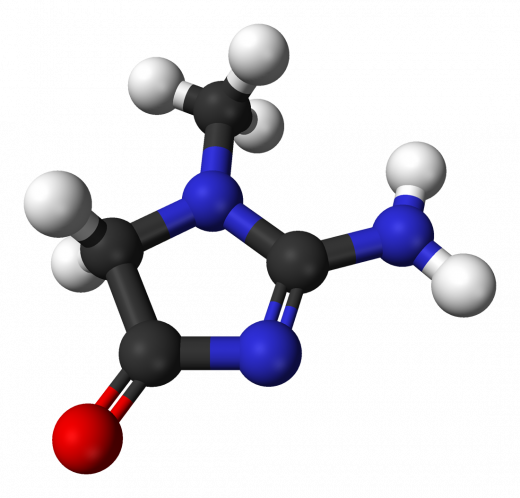Creatinine
Aim SensUs 2016
The goal of SensUs 2016 is that teams of students develop and demonstrate new biosensors. The biosensors measure the molecule creatinine in blood plasma. Why is creatinine an important molecule? What does it tell about body function? This article explains what kidneys do, what happens when they fail to function properly, and why creatinine is a very useful molecule to measure in a biosensor.
What is a molecular biosensor?
A biosensor is a small instrument that measures molecules in bodily fluids. A well-known example is the glucose sensor, which measures glucose in a small drop of blood. This biosensor is very important for people with diabetes, because they need to carefully control their glucose levels. SensUs has been conceived to stimulate the development of new biosensing technologies. Because biosensors enable personalized healthcare!
The kidneys
Kidneys are bean-shaped organs that are located high in the abdominal cavity, protected by the lower part of the rib cage. An adult’s kidney weighs about 150 grams and has a length of about one decimeter.
The main function of the kidneys is to regulate the water and salt content of the blood, and to remove waste molecules from the blood. The kidneys are very strongly perfused by blood: every minute more than 1 litre of blood flows through your kidneys. The blood flows mainly through the outer area of the kidney, the so-called cortex.
Creatinine
What is the origin of this molecule? Creatinine is a molecule that results from muscle metabolism. It is produced at a fairly constant rate in our bodies. Creatinine is a waste product that is filtered out of the blood by the kidneys. Studies have shown that the level of creatinine in blood can be used as a reliable measure for the filtration function of the kidneys. When the creatinine level in blood is higher than normal, it is an indication that the kidneys do not properly filter the blood. Therefore, creatinine is a very useful biomarker for diagnosing kidney failure.

Kidney Failure
When a person has kidney failure, the kidneys fail to adequately regulate the water and salt content of the blood, fail to filter the metabolic wastes from the blood, or leak proteins from the blood into the urine. The failure can be acute or chronic.
Acute kidney disease
Acute kidney disease refers to an abrupt loss of kidney function, typically within a week. Possible causes are inflammatory processes in the kidney or an obstruction of the urinary tract. It is diagnosed on the basis of measurements in blood and urine (e.g. a measurement of creatinine level) and the inability to produce urine. Acute kidney failure can lead to death. Furthermore, people who have suffered from acute kidney failure have an increased risk of acquiring chronic kidney disease.
Chronic kidney disease
Chronic kidney disease is a progressive loss of kidney function over a period of months to years. Certain groups of people have a high risk to develop chronic kidney disease, such as people with diabetes or high blood pressure. Chronic kidney disease has different stages. In the most developed stage, kidney transplantation or dialysis are needed. Unfortunately, there are not many kidneys available for transplants, so most of the time patients are placed on a waiting list and need to undergo renal replacement therapy, mostly in the form of hemodialysis, where a machine filters the patient’s blood. Hemodialysis has to be done every couple of days and every session takes a couple of hours. Dialysis represents a huge burden for kidney patients and strongly deteriorates their quality of life. Furthermore, the treatment costs are around 90.000 euros per patient per year. It would be highly valuable, for patients and for society as a whole, if severe kidney failure could be prevented.
Early detection is very important. Furthermore, the concept of having a competition is fantastic.
- Tom Oostrom, Managing Director of the Kidney Foundation

Why would one monitor creatinine levels with a biosensor?
The benefit of biosensors
Fast and easy
A biosensor is a small instrument for the rapid and easy measurement of molecules in body fluids such as blood and urine. A biosensor for creatinine would speed up the process of detection and monitoring, e.g. when a patient visits a doctor, when a nurse visits a patient, or when a patient wants to determine his or her own kidney function at home. An important goal would be to prevent, delay or manage the condition of kidney failure.
Patients take control
The availability of a biosensor would allow patients to easily and regularly monitor their kidney function, so that they can take control of their own lives. Every patient is different and his or her condition changes over time. For patients without a transplant, it would be beneficial to check at home if certain complaints or symptoms arise from a decrease in kidney function or not. For patients with a transplant, it would be an easy way to detect the starting rejection of the transplanted organ. It is cumbersome and very time-consuming to do creatinine testing via the GP and centralized laboratory. A biosensor would give less trouble and a quicker result.

Facebook
YouTube
LinkedIn
Instagram